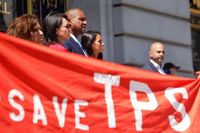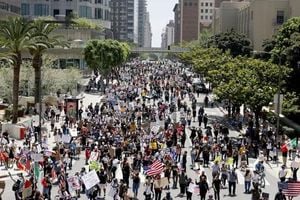On September 5, 2025, a federal judge in San Francisco delivered a significant blow to the Trump administration’s immigration agenda, blocking the government from ending Temporary Protected Status (TPS) for more than one million immigrants from Venezuela and Haiti. U.S. District Judge Edward Chen ruled that Homeland Security Secretary Kristi Noem’s move to revoke these protections was unlawful, arbitrary, and motivated by discriminatory intent, according to multiple reports including Reuters, The Independent, and AP.
The decision, which has immediate and far-reaching consequences for hundreds of thousands of families, maintains the legal status and work authorization for Venezuelans and Haitians who have lived in the United States for years under the TPS program. Many recipients, like a Venezuelan woman in Aurora, Colorado, have been living in a state of limbo—some even emptying their apartments to be ready to leave at a moment’s notice, as described by Reuters.
TPS was created by Congress in 1990 to offer temporary sanctuary to people from countries ravaged by war, natural disasters, or other extraordinary events. It allows recipients to apply for renewable work permits and shields them from deportation while their home countries remain unsafe. According to The Independent, the Biden administration’s extensions of the program ensured protections for Haitians until February 2026 and for Venezuelans until October 2026. Under President Biden, the program was expanded to cover about 600,000 Venezuelans and 521,000 Haitians.
But in February 2025, Secretary Noem abruptly reversed these extensions, arguing that conditions in Haiti and Venezuela had improved enough to warrant ending the program. Noem claimed it was no longer in the U.S. national interest to let these migrants remain, stating that TPS was only meant as a temporary measure. The Trump administration, meanwhile, has consistently framed its immigration policies—including the rollback of TPS—as necessary for national security and the rule of law.
Yet Judge Chen’s 69-page ruling found that Noem’s actions were not only arbitrary and capricious but also tainted by racial and ethnic animus. Citing derogatory statements made by both Noem and former President Donald Trump—such as Noem referring to Venezuelans as “dirt bags” and Trump’s baseless claim that Haitian immigrants in Springfield, Ohio were “eating the pets”—Chen concluded that “racial and ethnic animus can reasonably be inferred from the discriminatory statements made by Secretary Noem and/or President Trump alone.” As The Independent reported, Chen added that even if the government could defend these remarks, “a reasonable jury could still infer racial animus.”
Chen’s ruling also criticized the lack of meaningful analysis or review behind Noem’s decision. “There is no evidence of any reasoned decision making” behind the cancellation, he wrote, echoing findings reported by Reuters. The court found that Noem had failed to consult relevant federal agencies or conduct comprehensive reviews of country conditions before making her decision—a procedural flaw that rendered the move unlawful.
The judge’s order was made effective immediately, protecting the rights of TPS holders who had lost or were about to lose status. For the 600,000 Venezuelans whose protections expired in April or were set to expire on September 10, 2025, the ruling means they can remain and work legally in the U.S. for now. Haitians, who have faced widespread hunger and gang violence since a catastrophic 2010 earthquake, are also protected from imminent deportation.
Judge Chen did not shy away from the broader implications of his decision. He argued that revoking TPS would “inflict irreparable harm on hundreds of thousands of persons whose lives, families, and livelihoods will be severely disrupted, cost the United States billions in economic activity, and injure public health and safety in communities throughout the United States.” He further warned that sending immigrants back to countries so dangerous that even the U.S. State Department advises against travel would be “extraordinary and unusual.”
The ruling comes after months of legal wrangling. Earlier, Chen had temporarily blocked the Trump administration from ending TPS for Venezuelans, a decision that was upheld by an appeals court but later paused by the Supreme Court. The high court’s order was brief and did not explain its reasoning, leaving lower courts—and the affected immigrants—in a state of uncertainty. As AP explained, Chen’s new ruling does not conflict with the Supreme Court’s prior order because it addresses the merits of the case, not just a preliminary injunction.
The Department of Homeland Security (DHS) responded with sharp criticism. A spokesperson called Chen an “activist judge” and accused the Biden administration of turning TPS into a “de facto amnesty program.” The spokesperson added, “While this order delays justice, Secretary Noem will use every legal option at the Department’s disposal to end this chaos and prioritize the safety of Americans. Unelected activist judges cannot stop the will of the American people for a safe and secure homeland.” This statement, reported in The Independent and Politico, reflects the administration’s intent to appeal the ruling and continue its efforts to roll back TPS.
Supporters of TPS recipients, meanwhile, hailed the decision as a victory for immigrant rights and due process. They pointed out that millions of Venezuelans have fled political unrest, mass unemployment, and hunger, while Haiti remains gripped by instability and violence years after its devastating earthquake. Advocates argued that ending TPS would not only harm individuals and families but also disrupt communities and local economies across the United States.
Legal experts noted that the case highlights ongoing debates about the limits of executive authority and the role of the courts in checking administrative overreach. Some Supreme Court justices have recently expressed concern that lower courts are ignoring or defying high court rulings, but others argue that the lack of detailed explanations in emergency orders creates confusion and uncertainty. As litigation over TPS and other immigration policies continues, the fate of hundreds of thousands of immigrants—and the boundaries of presidential power—remain in flux.
For now, Judge Chen’s ruling stands as a reprieve for Venezuelan and Haitian immigrants who have built lives, families, and careers in the United States. But with the Trump administration vowing to appeal, the battle over TPS is far from over. The stakes could not be higher for those whose futures hang in the balance, waiting on the next turn of the legal wheel.





